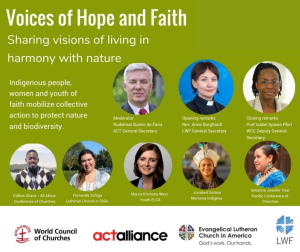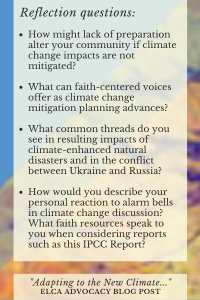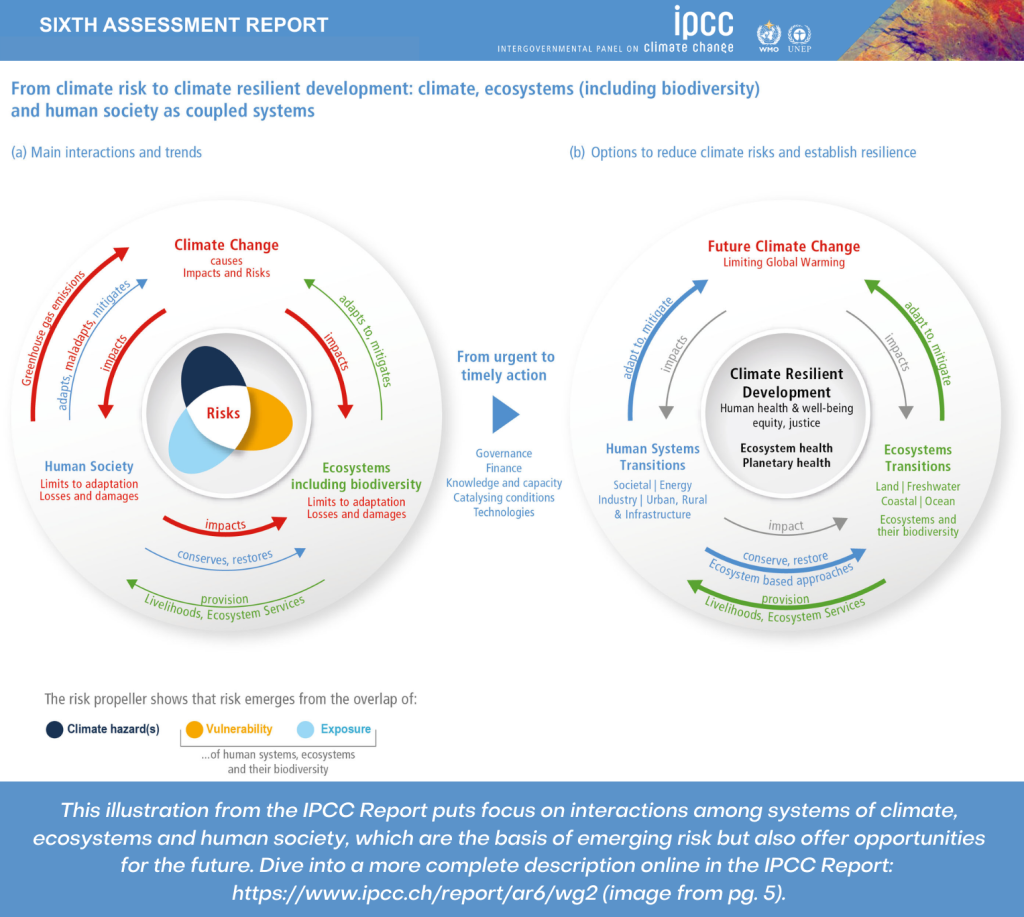By Ruth Ivory-Moore, ELCA Program Director for Environment and Corporate Social Responsibility
As Lutherans, we recognize our role as stewards of creation, called to care for the earth as God cares for the earth.* We are passionate about creation care and are aware of impacts climate change is having in our present and potential future. Being informed and prayerful keep us urgently engaged and hopeful in God’s promises as we not only marvel at the beauty of God’s good creation but also look at struggles with clear eyes.
A new – but deemed to be landmark – Intergovernmental Panel on Climate Change** report was finalized on Feb. 27, “Climate Change 2022: Impacts, Adaptation and Vulnerability” (IPCC Report). It highlights the widespread damage that has arrived with the changing climate and the urgent need to adapt to these changes. Unfortunately, the message is not new. Yet while the report re-emphasizes the dire situation the global community faces, it also emphasizes hope: The climate we remember is gone, but we can dramatically limit the damage and reduce our risk by adapting to the new climate.
A CALL TO ACT
The report succinctly connects humanity with biodiversity. Biodiversity is described by World Wildlife Fund as all the different kinds of life you’ll find in one area—the variety of animals, plants, fungi and even microorganisms like bacteria which work together in ecosystems to maintain balance and support life. “Biodiversity supports everything in nature that we need to survive: food, clean water, medicine, and shelter.” The IPCC Report is a wake-up call for all to act.
 On the same day that the IPCC Report was publicly released, the ELCA sponsored with ACT Alliance, Lutheran World Federation and the World Council of Churches a side-event to the United Nations Environment Assembly, which brings together representatives of the 193 Member States of the UN, businesses, civil society and other stakeholders to agree on policies to address the world’s most pressing environmental challenges. Our co-sponsored event, “Voices of Hope and Faith: Sharing visions of living in harmony with nature,” was an opportunity for youth, indigenous people and women to voice a call for action now.
On the same day that the IPCC Report was publicly released, the ELCA sponsored with ACT Alliance, Lutheran World Federation and the World Council of Churches a side-event to the United Nations Environment Assembly, which brings together representatives of the 193 Member States of the UN, businesses, civil society and other stakeholders to agree on policies to address the world’s most pressing environmental challenges. Our co-sponsored event, “Voices of Hope and Faith: Sharing visions of living in harmony with nature,” was an opportunity for youth, indigenous people and women to voice a call for action now.
AT A TIME OF CONFLICT AND CRISIS MOVE TOWARD CLIMATE JUSTICE, NOT DESPAIR
This report’s release comes during a time of conflict and extreme pain and sadness, felt with the conflict in eastern Europe and the uncertainty of the plight of the people of Ukraine. We are saddened by these events and pray for our brothers and sisters in Ukraine. It may seem like empty words, but I like many am distraught about this act of unprovoked aggression . This conflict is amplified across the world, underscoring how we are all part of the global community.
We are all connected. The livelihood of all is impacted economically from individuals to communities to businesses. The need to transition to a renewable energy society is more evident today. Energy independence must be achieved to avoid being subject to changing political landscapes and the unpredictability of the powerful. We must seize this moment of climate crisis and world conflict to move decisively to global resiliency. We do have the tools to make this happen.
“Our tradition offers many glimpses of hope triumphant over despair. In ancient Israel, as Jerusalem was under siege and people were on the verge of exile, Jeremiah purchased a plot of land (Jeremiah 32). When Martin Luther was asked what he would do if the world were to end tomorrow, he reportedly answered, ‘I would plant an apple tree today.’ When we face today’s crisis, we do not despair. We act” (ELCA social statement Caring for Creation: Vision, Hope, and Justice, pg. 5-6).
* Find reflections in the Caring for Creation: Vision, Hope, and Justice social statement, including pg. 2.
** The Intergovernmental Panel on Climate Change (IPCC) is the United Nations body for assessing the science related to climate change.

